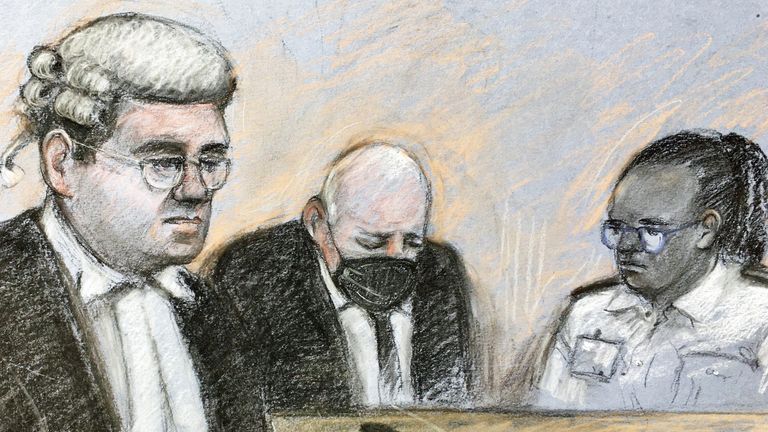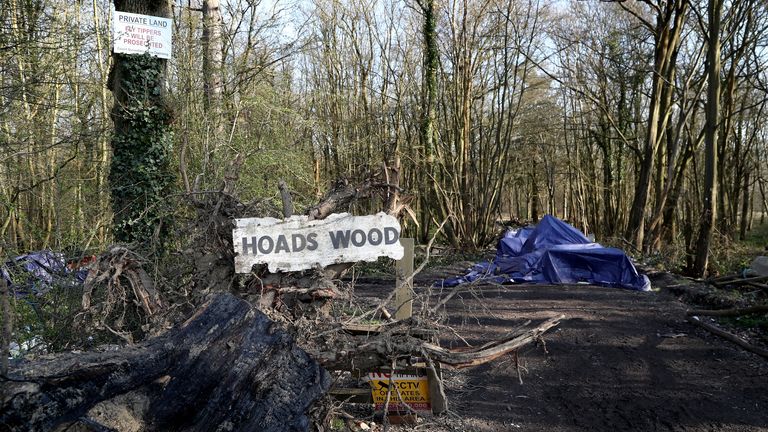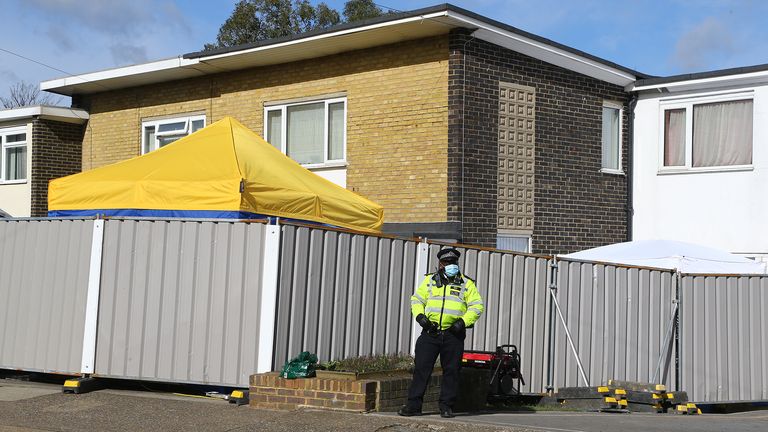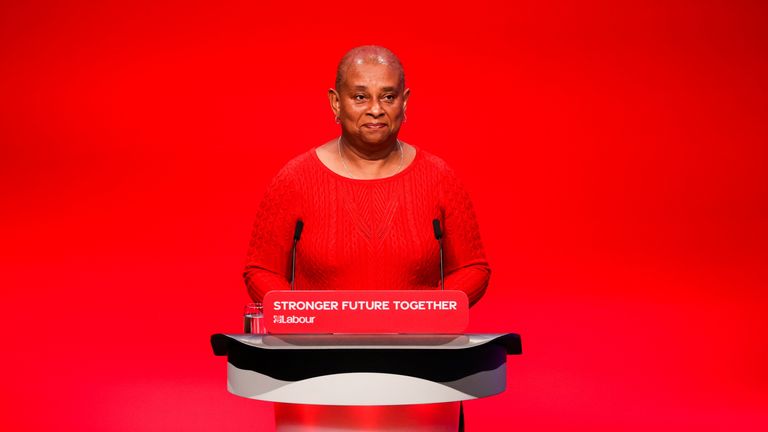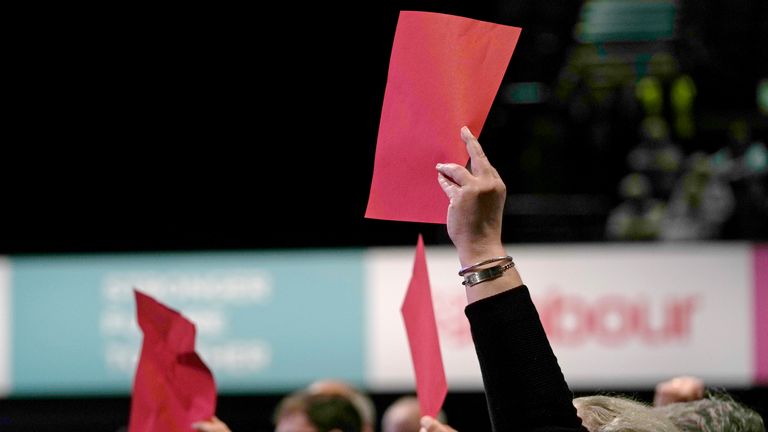A former police officer who kidnapped, raped and murdered Sarah Everard took his wife and two children on a family trip to the woods where only days earlier he had burned Ms Everard's body, the Old Bailey has heard.
Wayne Couzens, 48, was a serving PC with the Metropolitan Police when he used his position to arrest and abduct Ms Everard as she walked home in Clapham, south London, on the evening of 3 March, possibly by falsely invoking COVID lockdown rules.
Couzens, who had finished a 12-hour shift that morning, raped and killed the 33-year-old marketing executive before burning her body in a fridge in an area of woodland in Kent and dumping her remains in a pond.
Wayne Couzens sentencing - follow live updates
Speaking during the first day of a two-day sentencing hearing at the Old Bailey, Prosecutor Tom Little QC said Couzens took his wife and two children on a family trip to Hoads Wood on 7 March, where only days earlier he had set fire to Ms Everard's body.
En route, he withdrew cash from the same service station he had been to shortly after raping and murdering his victim, the court heard.
Mr Little said: "It follows that the defendant took his family on a family trip to the very woods where days earlier he had left Sarah Everard's body, then returned to burn it and then returned again to move it and hide it."
Couzens allowed his children to play in "relatively close proximity to where Ms Everard's body had been dumped in the pond", he added.
Couzens was arrested on 9 March and Ms Everard's body was found the following a day - a week after she went missing.
Opening the hearing, Mr Little said Couzens' crimes could be summarised in five words: "Deception, kidnap, rape, strangulation, fire."
Ms Everard had had dinner with a friend in Clapham Junction and was on her way home to Brixton when she was "arrested" by Couzens during the third coronavirus lockdown.
Couzens, then a serving diplomatic protection officer with the Metropolitan Police, handcuffed her at about 9.34pm after showing her his warrant card, the court heard.
Mr Little said Couzens was familiar with coronavirus regulations and may have used lockdown rules to falsely detain Ms Everard.
She was described by a former long-term boyfriend as "extremely intelligent, savvy and streetwise" and "not a gullible person" who he could envisage getting into a car with a stranger "unless by force or manipulation".
Couzens was said to be wearing his police belt with handcuffs and a rectangular black pouch, similar to a pepper spray holder, when he confronted Ms Everard.
He put her in the back of a Vauxhall Astra - hired using his own personal details and bank card - at around 9.37pm.
The married father-of-two set off for Kent, 80 miles away, a minute later. At around 11.30pm, Ms Everard was transferred from the hire car to Couzens' own Seat car, which was left in a non-residential area of Dover.
Couzens then drove to a remote rural area northwest of Dover where he parked up and raped Ms Everard, the court was told.
The Seat was picked up on an ANPR camera on a road in the town at 2.31am. "It is by this point that Sarah Everard is most likely to have been murdered," Mr Little said.
The moment Couzens confronted Ms Everard in south London was caught on security footage and witnessed by a couple travelling in a car.
Ms Everard was a mile from home when cameras from two buses, a refuse lorry and a marked police car caught footage of Couzens talking to her by the car, which was parked on the pavement with its hazard lights on and doors open.
The female passenger in the other vehicle said she saw Couzens and Ms Everard standing on the pavement. She watched as Ms Everard was handcuffed, Mr Little told the court.
"Sarah Everard was compliant, with her head down and did not appear to be arguing," he said.
Mr Little added that the female passenger believed she was witnessing an undercover police officer arresting a woman whom she assumed "must have done something wrong".
She remarked to her husband that she had seen "a woman being handcuffed" when "they were in fact witnessing the kidnapping of Sarah Everard", Mr Little said.
The next day, 4 March, Couzens took Ms Everard's mobile phone and threw it into a river in Sandwich, Kent. A broken fragment of an EE sim card from the phone was later found in his Seat, the court heard.
Couzens, who the court heard was thousands of pounds in debt, wiped his phone just minutes before he was arrested at his home in Deal on 9 March.
In a video shown at the Old Bailey, Couzens was seen sitting on his sofa, with his hands in cuffs, being quizzed by police.
An officer repeatedly asked if Couzens knew where Ms Everard was, saying her "family and friends are worried about her".
Couzens, who offered no resistance, initially denied knowing her, claiming he only knew of her disappearance from watching the news.
He then told detectives he was "in financial s***" and that he had been "leant on" by a gang to pick up girls after he tried to "rip off" a sex worker he had booked online.
The following day, a week after Ms Everard disappeared, her body was found in a stream in Ashford, Kent, just metres from land owned by Couzens.
Fragments of her clothing were found in nearby woodland, where her body had previously been burnt.
Mr Little said that while Couzens was in the wood he must have "moved Sarah Everard's heavily burnt body from where he had set fire to it, to the pond where she was subsequently found" using bags he bought from B&Q on 5 March.
In July, Couzens pleaded guilty to Ms Everard's murder, kidnap and rape by video link from jail.
Couzens told a psychiatrist he strangled Ms Everard with his police belt, which tallied with the conclusions of a post-mortem examination which found she died from compression of the neck.
The court heard how Couzens would wear his police belt and handcuffs while off duty and had a profile on dating site Match.com in which he gave various false details about himself. He was also in contact with an escort through an escort service.
The police watchdog has received a string of referrals relating to the Couzens case, with 12 police officers being investigated.
A senior investigator on the Sarah Everard case, former DCI Simon Harding, told Sky News that police "do not view" Couzens as a fellow officer and that he "should never have been near a uniform".
Speaking outside the Old Bailey in July, Met Police Commissioner Dame Cressida Dick said she was "very sorry" for the loss, pain and suffering of the Everard family.
She said: "All of us in the Met are sickened, angered and devastated by this man's truly dreadful crimes. Everyone in policing feels betrayed."
The Independent Office for Police Conduct (IOPC) said it was looking at whether the Met failed to investigate two allegations of indecent exposure relating to Couzens in February, just days before the killing.
Kent Police are also being investigated over their response to a third allegation of indecent exposure dating back to 2015.
Ahead of Wednesday's hearing, a spokesperson from the Metropolitan Police said: "We are sickened, angered and devastated by this man's crimes which betray everything we stand for.
"Our thoughts are with Sarah's family and her many friends. It is not possible for us to imagine what they are going through.
"We recognise his actions raise many questions and concerns but we will not be commenting further until the hearing is complete."
https://news.google.com/__i/rss/rd/articles/CBMilQFodHRwczovL25ld3Muc2t5LmNvbS9zdG9yeS9zYXJhaC1ldmVyYXJkLXdheW5lLWNvdXplbnMtdG9vay1mYW1pbHktb24tdHJpcC10by13b29kbGFuZC13aGVyZS1oZS1idXJudC1tYXJrZXRpbmctZXhlY3V0aXZlLWRheXMtYmVmb3JlLWFycmVzdC0xMjQyMTAzMtIBmQFodHRwczovL25ld3Muc2t5LmNvbS9zdG9yeS9hbXAvc2FyYWgtZXZlcmFyZC13YXluZS1jb3V6ZW5zLXRvb2stZmFtaWx5LW9uLXRyaXAtdG8td29vZGxhbmQtd2hlcmUtaGUtYnVybnQtbWFya2V0aW5nLWV4ZWN1dGl2ZS1kYXlzLWJlZm9yZS1hcnJlc3QtMTI0MjEwMzI?oc=5
2021-09-29 14:21:18Z
52781909119806



